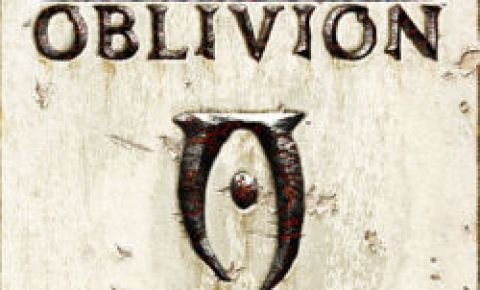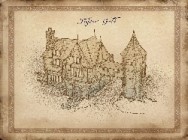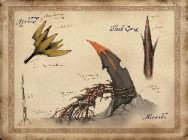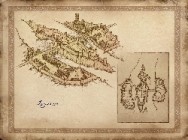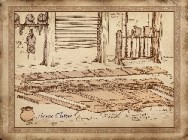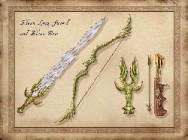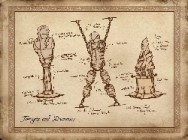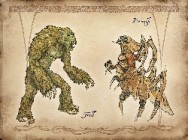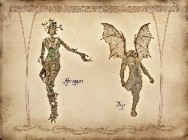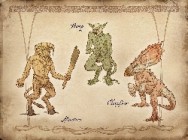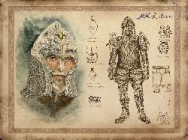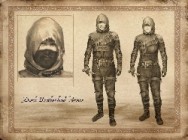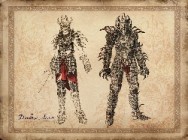I will be honest and admit that I have conservative tastes concerning RPG-s. I enjoy only those RPG-s that manage to preserve as much as possible from the essence of DnD/Pen and paper games (more here), not necessarily the fighting system, but rather the high level of interactivity of the main character/character with the environment and the beings that populate it. Wandering around and discovering long forgotten sites, being able to choose from virtually countless possibilities of solving or failing the quests you accept to undertake, being able to decide over the moral attributes (alignment, as in selfless, neutral or vile) of your main character/characters are just some of those aspects I search for in a RPG.
Concept To put it all together, by role-playing game I understand assuming the role of the main character/characters and building up the narrative/narratives according to my free will, imagination and power to improvise. This means I, as a player, am the one that shapes the direction and outcome of the game. However, as in all the other games, the player's progress throughout the game has to follow a predetermined set of rules and guidelines.
The major value of a true RPG is its social component. They are severely lacking in the hate-bringing competitive and economic value. Although they have a skill/attribute/level-up system, their outcome is decided on how well the character manages to interact with the beings that populate the world where the game takes place or his other human partners. There are no winners in an RPG, and the hunt for leveling-up has little influence over the gameplay as it is of no importance how witty and fit you are, but rather how sociable and charismatic you manage to be.
There is no need to mention that, according to my views, Oblivion is more or less a full-fledged RPG. I would have not made so much fuss about it if those darn trailers did not seem to promise a pureblooded first-person RPG. I should have known that, after three titles in a row (Arena, Daggerfall and Morrowind) without noticeable changes of the core game, the chances of a broken legacy were slim to none.
Bethesda Softworks did not screw the game recipe that granted it an important position next to some of the most creative game studios like BioWare, Black Isle (Obsidian), Looking Glass (ex-Blue Sky, now defunct), and Piranha Bytes. It is hard to guess why Bethesda has chosen not to add veritable social and moral variables to their game. From my point of view, this would not have disrupted the original TES gameplay. Instead, they implemented a primitive system of fame/infamy and a "persuasion" mini-game. TES veterans will not be disappointed though with this new title, but than again, it never knows.
The Elder Scrolls (TES) is a series of games that depict one of the richest unwritten fantasy universes ever created. This is probably the strongpoint of Oblivion: the huge world and its rich historical, religious and social background.
The game system of TES is somewhat inspired from Ultima Underworld, but it is hard to say for sure. The skills (fighting, spell casting, mercantile, speech craft, etc.) of your character only improve as long as they are put to use. The character levels up as soon as his major skills have suffered reasonable improvement. Point distribution applies only to attributes (strength, endurance, agility, willpower, etc.). Each skill is governed by an attribute, therefore, attribute point distribution is directly proportional to skill growth. To be honest, I dislike this system because it allows the player to touch the 100 barrier too early in the game.
On the other hand, thanks to a reasonable range of races and character classes to choose from, and thanks to the open-ended and open-designed character of the game (as there are only few "time & order" parameters in the game that constringe a player's decision-making), Oblivion does not put pressure on its players. The sense of freedom is even further improved as your role in the game's plot (even though it is clear your only option is playing hero) is kept under a shroud of secrecy and not fully revealed until the end. The developers wanted to protect the player from any "hero" responsibilities as much as possible, but they conspicuously forgot to provide the game with an alternative solution. It is as if no one will ever be crazy enough to swear allegiance to the Daedra and the Mythic Dawn.
The game orbits around the "adventurer in search for glory" principle. It is up to the player whether to concentrate on preserving the Tamriel Empire or search his glory somewhere else. However, Oblivion fails to provide an authentic alternative. I'll get to it in the "gameplay section".
Story (History of Tamriel) As it was expected from a respectable TES game, Oblivion is about another Daedric invasion. So, once gain, Tamriel, The Dragon Empire, needs a hero. The hero is you, just another convict (I would not see a lack of imagination in this "convict" thing, but a leitmotif of Elder Scrolls). The difference is that, this time the Emperor, Uriel Septim VII dies shortly after he prepares you for your upcoming role in saving Tamriel's fate.
The plot takes place in Cyrodiil, the central province of the Tamriel Empire. Men weren't always the rulers of Tamriel, but slaves of the Aldmeri (presumably the first mortal race, also known as Elves). Only when Tiber Septim rose to power, humans managed to defeat, one after another, all their foes and become uncontestable rules over the continent of Tamriel. However, without a powerful dwemer (dwarven) artifact he would have never succeeded. The bitter hatred of the ancient race of Chimer (ancestors of Dunmer/dark elves) for the Dwemer/Deep Elves (humans mistranslated the term with Dwarf; they were an Elven race, similar to the Chimer and Altmer, and were known for their scientific achievements and lack of interest for magic) sealed the fate of Dwemer and prepared the grounds for the new age of men. This was a turning point in the history of Tamriel. Gaining possession of the Numidium, Tiber Septim conquered all of Tamriel.
Although the nature of the relationship between Mankar Camoran's Mythic Dawn (a secretive faction of Daedra worshipers) and the Daedric Lord, Mehrunes Dagon is unclear, the Emperor and his sons are assassinated by the followers of this Daedric cult. Because of this, the Dragonfires in the Temple of the One failed. Without the fire of Akatosh, the supreme Aedric Lord, the barrier between Oblivion (the Deadric planes) and the mortal world was no more.
Mehrunes Dagon (whose sphere is Destruction, Change, Revolution, Energy, and Ambition) wishes to - once again - meddle in mortal affairs. Daedra are known for their penchant for extremes, their distaste for mortal beings and wish to transform Nirn (it means Arena in the Elven language, and it is the mortal plane), the world created by Lorkhan, the Missing Aedric God. This, theoretically, should not happen as Gods, Aedra and Daedra alike, have agreed not to manifest themselves in the mortal plane.
Dagon breaks this pact once again. Last time (TES: Arena), he helped Jagar Tharn imprison Uriel Septim VII in a magical plane, and assume his place as an Emperor. Although, it is said his wish is to transform Nirn according to his will, no one knows for sure what his true reasons are. Whatever are his reasons, one thing is clear. Oblivion gates opened across all Cyrodiil and a daedric invasion has commenced, the Emperor is dead and there is no successor to assume the throne, while you are asked to assume once again the role of an imperial agent and save what's left to save.
The delicate side of this matter is that Daedra are immortal, destroying their earthly, finite shell only "sends them back into Oblivion". There, after a period of slumber they regain their state of conscience but with a somewhat new personality and protonymic (the energetic component of the Daedra). This doesn't mean the Daedra change their form or identity (Azura will always be Azura, and a scamp will return from its banishment as filthy as ever), it only means that - though, still debatable - a returned Daedra can acquire an immunity to the form of energy that destroyed it. Therefore, Daedra will always return to the mortal plane no matter how many times they are sent back. Therefore, it matters less whether the Hero of Cyrodiil succeeds to banish the Deadric Lord back into his realm, but how he accomplishes it.
A thing or two more before I jump to some gameplay analysis, I believe Oblivion should have had a much more powerful, non-linear narrative. The TES universe cannot solely cover for the narrative. All good stories need scope, intent, execution and talent to back it up (not that Oblivion hasn't any of these, but the "save the king" & "save the kingdom" thing is a little smoked out).
Gameplay As much effort was invested in creating the Elder Scrolls universe (in this case Cyrodiil), with its incredibly detailed landscapes, architecture, social order, religion, cosmology, and written history and mythology, as little was done to integrate the playing character into it.
The general impression the game left me is that it was either treated superficially, or developed to satisfy console, casual players. I could as well, be wrong. Oblivion is an ambitious project (just look at those disturbingly ecstatic landscapes, and just peek in that exacting daily NPC schedule) and as with all ambitious projects, failure is a distinct possibility. Although, the forth of the Elder Scrolls is the best in the series, it looks like walking the same plank to me, but with light, golden shoes. I mean, it only refines its same ol' drop-dead bore formula, and this is exactly what it's set out to do. Not only does it not "redefine the RPG genre" as that misleading marketing mambo-jumbo led us to believe, but I suspect that wasn't even the developers' intent. It is just another fine example of marketing all-front flawless press manipulation. Pathetic!
The first thing to find distasteful (totally against my expectations) is that monsters scale in difficulty based on the character's level. The fact I find this against role-playing principles means nothing compared to the fact it eliminates any strategic approach concerning the quests, level-up or the order in which sites should be visited depending on their complexity. It makes no difference, no-matter how many times you'll replay the game it is going to be the same all-around experience (where is the role-playing, man?). Whatever it may be, quests, places or skill-trees address only to the player's senses, not at all to his tired-by-monotony brains. Diversity - if it is something that deserves to be called this way - lies only in the architecture of the sites you visit or in the background of the quests a player undertakes.
Something that is marketed under the pompous name of "role playing game" should offer extensive freedom of decision-making and quest interconnection. I hoped and hoped and eventually lost it all throughout my 110 hours of playing. Realizing that I was only playing an action-adventure game with some rpgish spice over the top, I fastened my seatbelt and rushed to save the darn Cyrodiil. Being master of all the major factions (Mage Guild, Fighters Guild, Dark Brotherhood, Thieves Guild), member of all orders (The Blades, The Knights of the White Stallion, The Knights of the Thorn, The Order of Virtuous Blood), Grand Champion of the Arena and Champion of Cyrodiil (after completing the main quest) was some sword of sick statistic and almost nothing more: some positive remarks, some maxed moods/dispositions and several bags of sand. Otherwise, I was just another citizen that may have something to report in order to avoid being forced to move along by an imperial scum.
Although most (if not all) of the quests have a brilliant finish (examples: enter some guy's dreams - Max Payne style - to help him wake up, enter a painting to save the painter, play the role of an Agatha Christie's assassin, look for kidnapped girl in a secluded town without knowing that its residents are psychopaths, convince someone to kill you and pray that the Daedric Lord that has given you this task will keep his promise and it will bring you back from the dead), they are not interconnected, and although many have more than one solution, their outcome may vary only in the quality of the prize, if any. Those who took part in a secondary or guild advancement-related quest won't interact with your character later in the game. On the other hand, although there are other factions (the evil and idiotic ones) like the Mythic Dawn, or the Necromancer Guild, the Black Bows, or the Blackwood Company, you won't be able to become a full-fledged member (but only infiltrate in some cases) and fight by their side. Neither can you re-write the history of Cyrodiil, by helping the Daedra overcome the mortal realm. Fail any of the main quests and you will be prompted to load a previously saved game.
I truly hoped, for instance, that I could somehow infiltrate the thieves' guild and sell the Grey Fox to his archenemy, Captain Hieronymus Lex and join the Imperial Guard. No way, Jose! Things are nailed to the cross like Jesus. Or, do I have to mention my surprise when I did the quest for the fake vampire slayer (Seridur of The Order of Virtuous Blood) and he did not notice that I was a vampire, like him? But the number one in my "the most ridiculous things from Oblivion" is an encounter with some undead guy who really wanted to express his beliefs concerning mortal predictability - as if I was mortal or something. Of course, I had no choice but to sharpen my cleaver on his ethereal, twisted presence, but a dialogue line like: "I was expecting you adventurer. From the moment you set foot in my manor, I knew I could count on your ambition and curiosity to pull me out of my slumber?" would have not impressed me in such a negative manner.
The bottom line is while the quest thing may be enthralling to undergo for their background-story's sake, it is one-way ticket only (as in "do not recharge", "do not throw in fire" or, better said, "first use only") and they have no real finality: what's the use of doing this or that and be the errand-boy of Beavises and Buttheads if it changes nothing?
The news system (spreading of news about important events among the NPCs) of Oblivion is rather superficial (as I have already pointed out), as if the game was designed for the seven year old. There are great discrepancies between the things you've done and "those" (Vampire, Grey Fox, Grand Champion of the Arena, Arch-Mage, writer of the forth Elder Scroll, Master of the Fighters Guild, Listener of the Dark Brotherhood, "Daedra Slayer", "Oblivion Gates' Cerberus") you've become. The world's ability to react to your actions is low to inexistent. Guards treat you like a nobody (although, looking at the medieval system of social order of the game, I should have been allowed to kill on spot anyone who did not show a reasonable amount of respect towards my character). To put it simple, your actions are rarely linked to the game's story. Instead, there are two full menus with statistics about your character. Who cares about statistics, having a rank in a guild or being its master, if this has no real effect over the NPCs or the outcome of other quests? I would not make so much fuss about it, if this wasn't the very heart of any RPG.
Even with this major shortcoming, Oblivion has much to show (as an action-adventure game, of course, as it is nowhere near the RPG genre, what did you think?). Coming to think of it, with all my rough criticism, I cannot find any excuse for the fact I have finished every single quest available in the game - a thing that took me about one hundred hours. This shows - beyond any doubt - the gameplay value of Oblivion. To date, I have never shown so much interest in a game. Even Gothic, its arch-contender, wasn't able to ensnare me so effectively.
So what it makes Oblivion so addictive? It is the approach. There are three main specializations (magic, combat, stealth), thus three ways to play the game. No matter what specialization the player chooses, Oblivion is designed in such a way it makes it possible to (without ever excelling, though) combine all of these specializations no matter the player's option. For instance, as an Orc specialized in combat skills, a player may still enjoy spell casting or sharp shooting activities as an "if things get out of hand" alternative. And there is the 16 square miles of land, little water coverage and around two hundred underground sites waiting to be sacked by adventuring players. I'll get to this in the "Video" section.
The "chance to" algorithm from Morrowind was flushed down the drain. The combat system received the long-expected action-game touch. Dodging, disarming, knocking back or down and staggering your opponents help the game feel more believable and dynamic. Moreover, spell casting works as an alternative form of attack. Yes, you can use spells while holding/using a weapon (bow or sword), there is no casting stance required anymore.
Unfortunately, the "ranged" combat did not receive much attention. There is only one type of weapon corresponding to the marksmanship skill: the bow. It is probably the weakest weapon type in the game, and if not combined with the sneak skill, it is actually useless. The bow was redesigned. The ballistic of the arrow was refined. Even if it does not fully respects basic physics, it has weight, speed and trajectory parameters. This means projectiles do not follow straight lines anymore when flying over long distances. Unfortunately, when hit, your targets react as if a battering ram smashed them, or they do not react at all? I was hoping for something a little more advanced like: high velocity/highly piercing bolts fired from painfully-slow loading crossbows, heavy and destructive throwing axes or hammers (something worthy of a mighty Orc) and arrows bouncing off heavy armor-plates, otherwise absolutely vital against enemies hidden behind obstacles. The Havok engine should have made possible this kind of stuff, people's imagination and desires were - it seems - against it. I won't mention anything about javelins, it is already too much.
Thanks to a totally imbecile AI that without divine intervention would never become aware of your presence - otherwise I cannot explain how do they manage to spot something in zero visibility conditions (hidden behind a solid object), the sneak skill is, as the case with marksmanship, totally worthless in combat. It would have been great to have levels of awareness as it was the case with Splinter Cell: the creature feels confident as it believes the area is secure, it has some doubts and feels it should take a look around and check the access areas, it is certain there is someone in the area but it isn't able to spot the intruder, it has spotted the intruder and either attacks him or tries to detain him (depending on the specifications of the area the creature has the mission to protect, or its orders, if any), it managed to detain the intruder and has identified him (a guard catches and recognizes you - he sets a bounty on your head if you decide to resist arrest).
I cannot stress enough the overwhelming sensation of futility when fighting level 30 or so monsters using the bow (default difficulty setting). Imagine that for each one of them dozens of some of the best arrows are required. Let's do some arithmetic: an arrow weighs 0.1, multiply this with a number between 30 to 75 and you will get the weight of the equipment needed to kill ONE monster. Now imagine yourself entering an Oblivion plane that is defended by at least ten Daedra. How many arrows do you need - without counting those misfired? How much would such a quiver weight? Projectile weapons of the middle-ages were - beyond doubt - the deadlier weapons on any battlefield. This, however, is not true in Oblivion. Well, the wisest choice is the magic specialization. Combat skills will eventually reach the 100 limit - even if they aren't major skills - but they are not much for the destructive (and crippling) power of magic. Remember that spells have no weight and weapons (even some of the best) can be conjured by any capable battle mage.
Do not get me wrong, even without my "maniacal" ideas, the combat experience is well above any of the previous TES games, or its direct contender - Gothic. The fact that you can simultaneously combine all types of attack (blade, blunt, with or without shield protection, unarmed, magic, bow) makes any clash pure adrenaline. But this feeling wears out rather quickly thanks to the brilliance of your adversaries' AI. Who did the beta testing? There is a father that needs to take the flat side of a broadsword to his beta tester's behind for this.
Radiant A.I. and Combat A.I. What is this? Well I have asked myself the same question. Do you remember Gothic and that natural, real-life like daily NPC schedule it had? Well, it is that plus many other things. Know that it is in-house made and it isn't daily, but monthly. Every (almost) NPC in Oblivion has needs and goals and tries to follow them. It is not pure scripting as it was the case with Gothic's NPC-s. It is a form of decision-making determined by the NPC's abilities. For example, as soon as a NPC feels the need to feed, it will try to provide some. Depending on its skills and resources, it will try to hunt, buy some from a merchant, steal or cultivate vegetables. However, I believe there is also a lot of scripting involved. There are too many algorithms involved (just follow a NPC and watch what it does? there are so many things it does, and so many it does not, even though it should). With or without scripting, the NPC daily behavior is indeed well above anything I've met to date. Some thief that was stealing from someone that had given me a task startled me once. I was returning with the good news, and I did not know what to believe when I saw one of my fences looking for trouble inside some one else's house. I did not know his name well by that time, so I attacked him. To my surprise, the victim "jumped in the heat of the battle" to help me! (Depending on their disposition towards you, NPC-s try to protect you, even when you have trouble with the guards).
In combat however, the A.I.'s behavior is preposterous, not that the Radiant A.I. is flawless (I saw with my own eyes how two Legion Foresters were hunting each other). Simply put, fighting against Oblivion's Daedra reminded me of the battles against M&M's devils. It cannot jump, does not commit ranged attacks while moving, does not move in diagonal, does not try to encircle you, does not team up with other attackers. I'll stop here, the list is exaggerated already. I expected to see at least a territorial behavior: growls three times and if you do not react accordingly, it attacks. But that chaotic-aggressive behaviour of all creatures (except deer) is absurd. Bears, wolves, crabs, will-o- wisps (pathetic in-looks, an absolute life-obliterator in wits) and mountain-lions alike attack you on sight. And it makes no difference that, a moment ago, they were clashing with daedra underlings. The whole bunch, daedra or not, is eager to hunt you down as if you were suffering of leprosy or something. The good side of this is that "rescue and protect" missions are like some twisted kind of slaughter with voyeurism (paradoxically, your target is the one watching as you receive some good spanking, as the A.I. does not notice that someone else, besides you, is present on the scene).
Character Mechanics Under a superficial analysis, it will seem that things are approximately the same as they were in Morrowind. Using your major skills results in level-ups. Every skill has a governing attribute. Each level up allows you to make some point distribution to three (out of eight) attributes. The number of points is determined by how much you have been used its governed skills.
The skill number has been condensed into 21. The character may have seven major skills, while the rest are considered - by default - minor. The gap left by the large number of removed skills (medium armor, enchant - now a perk for members of the mage guild -, dagger, shortsword, and longsword, unarmored) allows patient players to touch the 100 skill barrier with ease. Even though the place of the missing skills was taken by added actions for improved skills (there are five levels for each skill: novice, apprentice, journeyman, expert, master), it only encourages further exploitation. Add to this the fact that, in combat, anything you are able to do can be done by your opponents (thanks to the darn difficulty scaling) and you can say goodbye to the last bastion of role playing game value.
The fact you can exploit the whole level-up setting, isn't that bad. After all, it allows you to experience different playing styles and it reduces the chances of messing up your character. However, character specializations should have been more restrictive, better focused on the attributes and skills they govern. Indeed, a fighter will never have the chance to use powerful spells because it has severe magika restrictions, but a mage can become a swell fighter as soon as he learns to use a sword properly. A mage or marksman should have never been allowed to learn power attacks (disarming, paralyzing attacks or knock down).
Moreover, the sneak-marksmanship mix should have been more carefully developed because the way it looks right now (even if it has some innovative futures like ignore armor, paralyze or sneak attack) it isn't worth it to even think about trying it.
To be straightforward, the whole specialization stuff is useless thanks to the scaling difficulty setting. Above level 30, any fight against more than one opponent is pure nightmare. The same Daedroth that, at lower levels, needed just two good blows to give its last breath, has a good chance to put you to bed for good, if you did not gain mastership in at least one combat/magic (destruction or conjuration, only) skill. Hopefully, there will be a mod to fix this issue. Thank God for the building tools! Praise Bethesda!
I almost forgot. Oblivion has several breeds of horses, but they are just for show-off. You cannot use them to carry your stuff or charge your foes with the spear. It doesn't even worth to ride the darn thing. Two are the reasons, your athletics does not improve, they are impossible to handle and make the whole thing look like a joke thanks to their state of the art animation. Shadow of the Colossus, anyone? (I was thinking about how great it would have been if the strength attribute governed the weight of the equipment you could wear, and not how big could get the scrapheap you can carry with you - what's the use of a good horse if not of the average mule?)
Interface Exercise some scrolling with your mouse because it is going to be a long ride. The easy-to-use, highly configurable menus from Morrowind have been scraped to make place for a console-like, totally screwed interface with useless statistics and little useful information. Although you can fast travel between locations once again (in a more limited form than that of Daggerfall) and even a compass has been added, the map is totally confusing. You'll have to drag your mouse over a land symbol to remember its name, and just one landmark can be used although there are numberless quests which force you to do some scouting (Where was Malacath's Shrine again? Oh, no that's Molag Bal's! Let's see now? it must be here somewhere among the other 16 Daedric Shrines) and hundreds of locations. It is just stupid to try and remember them all.
The same with the shortcuts. Only eight available to cover for hundreds of spells, items and weapons? One fight only may require you to use up to five spells (heal, cure disease/curse, or restore an attribute if damaged, a destructive or conjuration spell, night vision or detect life, protection from something, and drain or damage something) not to mention the two traditional weapons (bow and axe for instance) and the repair hammer that (if you hate scrolling) should be assigned to a number. Honestly, it is a drag.
Video The graphic engine used in Oblivion is an improved version of Gamebryo, the same used in Morrowind. It was developed by Emergent Game Technologies, and although it does a great job when showing off static objects, it is a total let-down in terms of object-animation. For this, Bethesda decided to use Havok (more here). Combat animations, aside power attacks, still look gruesome. Imagine a two hundred kilos giant lizard (Daedroth) that just won't budge no matter how many times you crashed its bones with your one ton war hammer but takes off like an F22 as soon as a microscopic 0.1 kilos arrow hits it. At least, every dungeon is filled up with traps. And they feel just right. However, this does not mean the Havok implementation is a totally let-down.
So let's stick with static objects. Know that if you do not own a kick-ass graphic card (Nvidia 6600 and above, or ATI x1000 series) that does not support HDR (High Dynamic Range), you have lost about 50% of the beauty of Oblivion (but know that the game works just fine even on some very old graphic cards like ATI 9000). Without it, the fairy-tale atmosphere is completely lost. It is the difference between a joyful, clear spring day and the depressive autumn days. HDR is a form of lighting effect that dynamically alters depending of how it interacts with various objects and surfaces, as well as the environment in which the light source is portrayed.
Believing that the HDR lighting effect is similar to BLOOM is a mistake. Unlike HDR, BLOOM (although it also alters the appearance of lighting in an attempt to make it seem more realistic), it is less (if not at all) dynamic. By definition HDR is dynamic, has a wide color range and it is constantly altering based on the surface type of different objects and the source of lighting.
There are eight fortified (medieval-like) cities or burgs (to be more specific) with unique architectural styles, city planning, banner symbols and military fashion. The Oblivion artistic designs are inspired by either the late Western-Roman, or early medieval European (IX-X century), pre-Romanesque art (the Carolingian Renaissance, Anglo-Saxon or German/Ottonian arts, X century). But there is also an influence concerning the architectural styles used in the game (some of the building interiors or the Temples of the Nine). Many types of fantasy, eye-candy structures and facilities (tall walls, gigantic towers) are visible from every corner of the map also fill Oblivion's landscapes.
But let's be serious. We are grown-up men: where are the darn murder-holes and archer/scout vantage points? How are those citadels supposed to be defended against a Daedra attack? And what's the use for the watchtowers and keeps - stashing goods? Please! I understand that that the fine detailed building interiors eat system resources like Big Mac with Coca-Cola, but the Daedra surely deserved to win the war. I cannot believe the whole "candy-eye", military abominations resembling defensive walls have been actually allowed in the game! I'll tell you why! The whole city is an indoors setting (and the walls work as borders) which has the role to keep the system requirements reasonably low as if a gazillion dollar graphic card isn't required to play the game. Probably, in a century or so (as it was the case with Morrowind) some of us will be able to play the game with a low-detail setting. Otherwise, consider your fx7800gt a low-end graphic card if you intend to squeeze some eye-candy from this bugger. We are talking SLI here, or worse!
We have "jaw-dropping" sized burgs, gargantuan "golden-towers" and all, and no one to populate these things? Is this another "system-requirements" "game-cut"? I have the feeling that someone skipped the geography lessons about demography. Otherwise someone would have certainly opposed such a decision. Just ten men defending Bruma - where is everybody? And I am supposed to "lead the attack" and win? Oh! Silly me! I forgot that the daedric war-machine gathers up a bunch of six Dremora that stop re-spawning (it is not fair, but then again, what is fairness?) only when you've performed some task that you have been commissioned by the Emperor to.
You should have seen my face after I have set foot in the Imperial Capital. That colossus populated by a bunch (twenty is the magic number) of nerd-looking merchants mixed up with a couple of sour-tongue citizens and their city-guard attachments who jump on your back as if they were CIA agents with "telepathic" powers (otherwise I cannot explain myself how can one catch me without actually seeing me, or how do all guards know what have I done - in an intimate/secluded place - to one of their fellows). The bottom line is that fortresses that could easily provide room for one thousand people are home to a measly fifty citizens and guards (statistically speaking, half an hour is enough to kill and burry them all).
And why do children only come in the form of skeletons scattered across Night Mother's lair (the banshee-like leader of the Dark Brotherhood)? At first, I took - by mistake - Wood Elves for children, a golden-haired fellow circling the Arena, in particular. There is not a single child in the entire game! Some said that Oblivion is discriminatory towards women. Just lies! It is discriminatory towards children.
Where I am going with this? Without a satisfactory number of full-fledged NPC families and their respective protection (as in warriors, soldiers, mercenaries) the whole substance of the game is doubtful. What is there to serve and protect, what is there to be saved? A bunch of selfish-looking citizens and unfair guards? And there are no sides to choose from either!
The other good news (aside level design and dynamic lighting) is the artistic redesign of the bestiary. Beasts in Oblivion look more beast-like. And those of you who hated the pretty-alien looks of Morrowind's creatures, can breathe relieved. Aside some "aggressive" crustaceans and a bunch of "killer" will-o-wisps, everything else looks as evil as it should. Eh, well, I have to be honest. You should be prepared to be attacked by anything (except deer that act accordingly, and birds as there is not even one), including giant rats. Talking about giant rats: what is the whole point behind them? Why should every adventure game have giant rats? What am I missing?
As for the armors and weaponry, I have two questions: why do cuirasses (still) bend when my character breathes or moves? And why do Blades wear "roman" inspired armors and use Katana as their main weapon? It makes no sense. Roman plate mail is designed to protect against weapons like the gladius (thrusting weapons) and offers little protection against the razor-sharp, slashing blows of the katana. It is a game that takes place in a fantasy world. I cannot doubt it. But fantasy objects without a clear fantastic functionality could have as well missed. Not the looks, but the purpose of the object is important: "what does it do?"
Sound An aspect of utmost importance is the integral redesign of the dialogues. Opposed to Morrowind where one could easily get lost inside a chaotic system of help-file like, text-only dialogues, in Oblivion they are organized in a much natural, easy-to-use list system with a full voice acting back up. It is no secret anymore to whom do these voices belong to. The performances are all world class - Patrick Stewart (Uriel Septim VII), Sean Bean (Martin Septim), Terence Stamp (Mythic Dawn's spiritual leader, Mankar Camoran and the Daedric Lord, Mehrunes Dagon), Lynda Carter (Nord Females), among others - and because the game lacks the "epic" feel, we can concentrate on the tale and the tiny details that add up to a bold pronouncement.
Jeremy Soule's compositions (Dungeon Siege, Guild Wars, Knights Of The Old Republic, Morrowind, Neverwinter Nights, Warhammer 40K, Icewind Dale) are easy recognizable. The leitmotifs from Morrowind will enchant your ears once more through their drama and intensity. Unfortunately, the selection of tracks is extremely poor for a game of such a colossal size. Half an hour of music cannot cover for the tens and hundreds of hours of gameplay.
The ambient sounds are fairly good, but they, also, have something of the nature of the whole game: fair without ever excelling. It is unacceptable to have misplaced sounds like crickets on the frozen slopes of the mountains. And why have houses, caves, temples, grasslands, weather, night and day, if their sounds are not dynamic? NPCs' voices sound the same, no matter where they are: indoors, outdoors, the same radio-station resonance. Shields splintered under the thunder strikes of war hammers and claymores, inside an ancient, long-forgotten Elven ruin sound as if the clash is taking place in my bedroom. Where is the feeling, where is the drama of medieval combat style? Where are the terrified screams, where is the echo of severed flesh? And why the grass or the leaves aren't making the sound they are supposed to? With such beautiful landscapes, these shortcomings stung my ears like a daedric needle.
When was the last time any of you spent a vacation in the mountains? Do any of you remember how did the forest sound like? The forests of Oblivion look as lively as dead their whisper/music is. Bugger!
Conclusion From my point of view, Oblivion is a monumental failure because it assumes a level of importance it does not earn. I'll remember for a long time the line of an imperial legionnaire: "Move along citizen" (and I was the Champion of the Empire, wearing the Emperor's dragon full armor plate). It shows exactly what Oblivion is all about. I, as a player, do not deserve a single word of admiration? at least for spending a hundred hours of my lifetime to complete the game. I am not a brainless buyer, and not at all a brainless gamer. I hunger for smart games, games that force your brains accelerate their synapses. How hard is it to make a reasonable NPC dialogue scripting? The thought that the revenues were much more important for the developers than putting together a mature game, over encumbers me. I hope I am very wrong about it. Nevertheless, this doesn't absolve anyone of the guilt of making a console-based game for PC. Although Oblivion left me a fairly good impression, it did not exceed my expectations. An exception is the level art and design.
On the other hand, I am mad at my fellow journalists who contented themselves with a superficial look at a game with such prestige. Furthermore, they successfully redefined the RPG notion into some twisted vagueness specific to the brain-dead console games, something which has absolutely nothing, "nada!" in common with the origins of PC RPG-s, the Wizards of the Coast's DnD games. Where is the dynamic news system? Great deeds give birth to rumors and rumors give birth to legends. And where is the freedom of decision-making that should dramatically determine the course of the entire story? How can one become a hero if his faith is sealed by the will of the storyteller? There can never be Good without the temptation of Evil - where is the dark side in Oblivion? And what is this "master of all guilds" bull-manure? What is this, GTA?
To make it clear: Oblivion is an adventure game made up of hundreds of mini-games marketed as a RPG, but no-where close to something like it. Very few games (Gothic, Fallout, Planescape Torment, and just partially, the KotOR) deserve this title. All the others are just dungeon-crawl adventures with an rpgish level-up&character class system. The future of RPG-s is doomed. Wait! There is no future of RPG-s. (Hanging my head in defeat).
Note: My mark reflects the value of Oblivion as an action-adventure game (graphics, level design, world-size, immersivity, etc.)
RELATED LINKS
The Elder Scrolls Official Site Tamriel The Elder Scrolls' Pantheon Cyrodiil Daedroth Daedric Princes The Elder Scrolls The Mer/The Elves The Imperial Library Races present in Oblivion The Aedra The Nine Divines Lorkhan The World of Nirn Oblivion Tweak Oblivion at Tweakguides
 14 DAY TRIAL //
14 DAY TRIAL // 